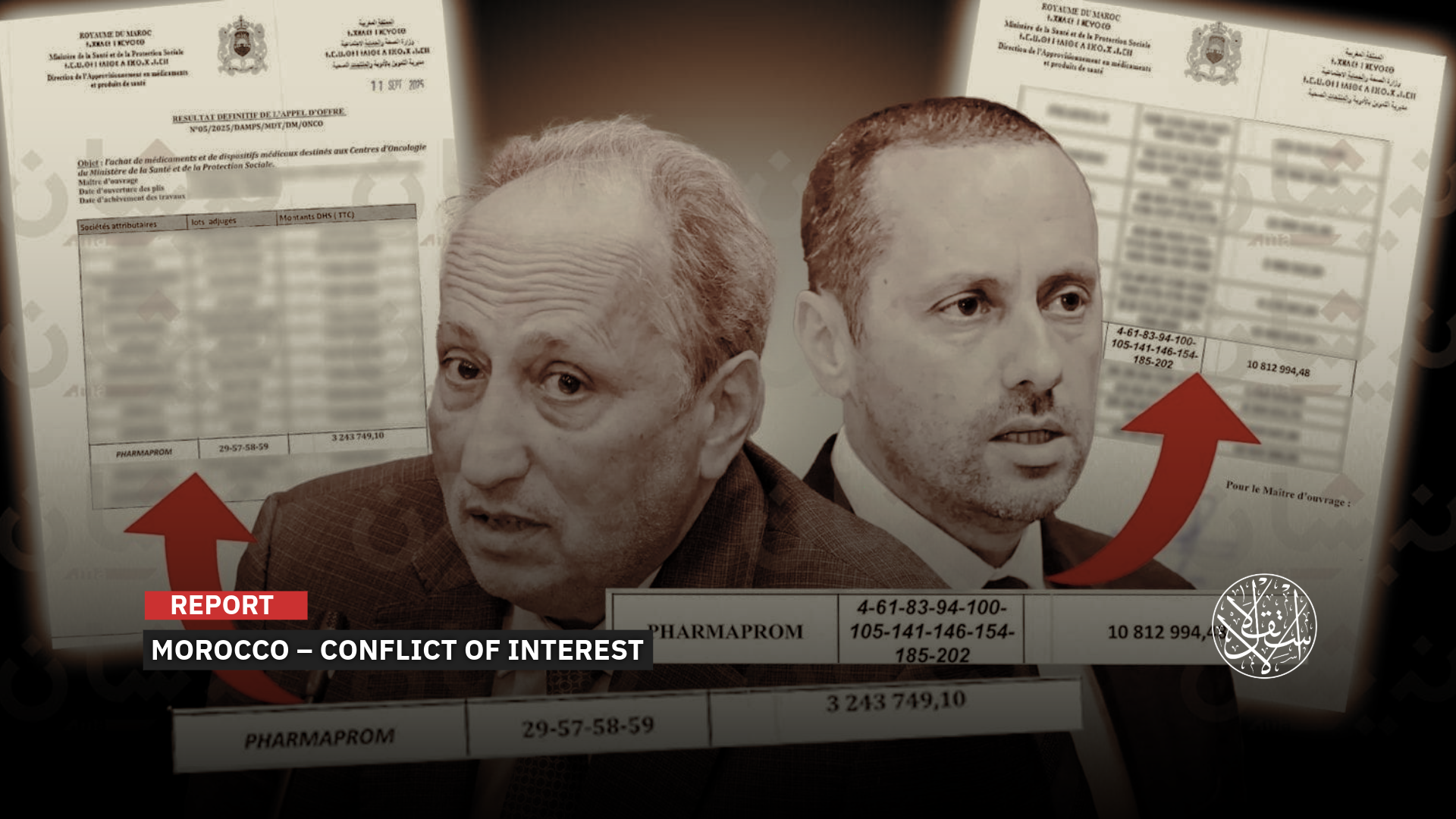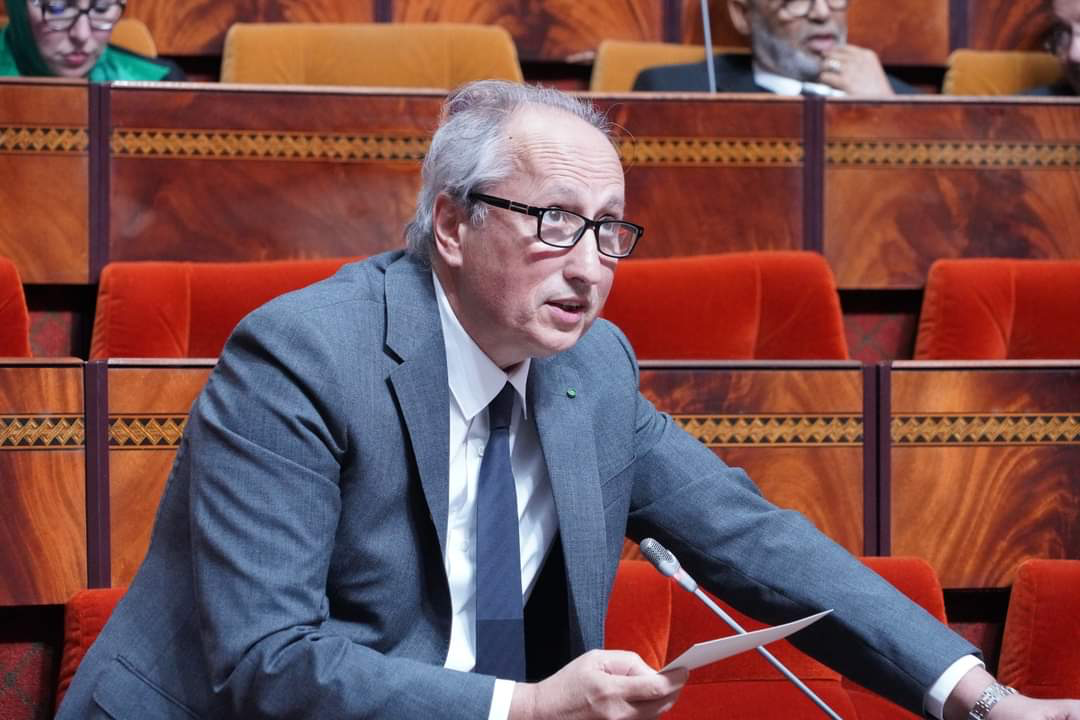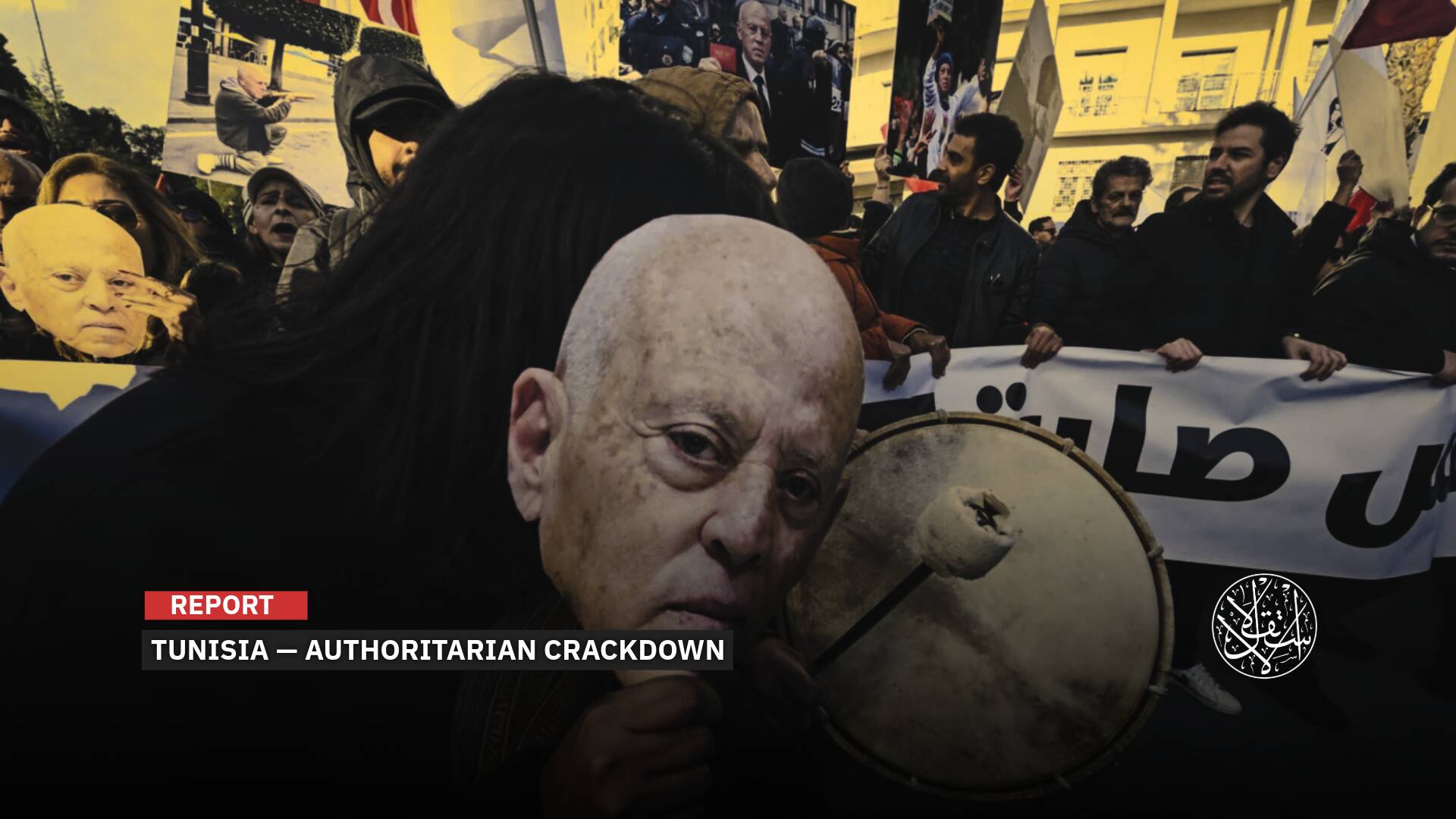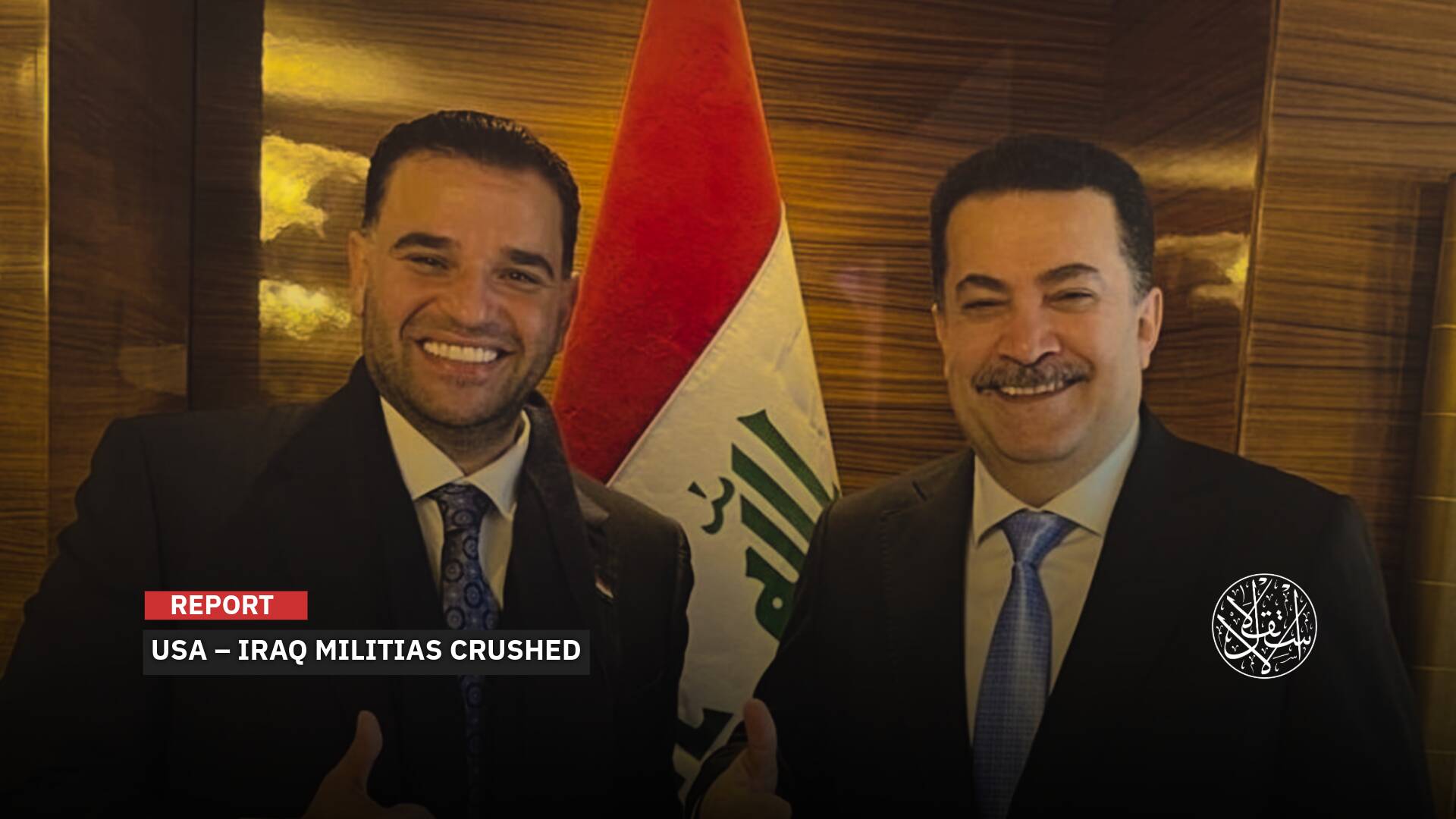A Corruption Scandal Rocks the Moroccan Ministers of Health and Education

“The two ministers operate according to the same philosophy as the head of government: conflict of interest and abuse of power.”
It seems that the scandals that haunt Aziz Akhannouch’s government in Morocco will never end, especially those related to accusations of corruption, conflict of interest, and abuse of power.
The latest of these scandals was revealed by the head of the Justice and Development Party's parliamentary group, Abdellah Bouanou, during a session dedicated to discussing the 2026 Finance Bill on October 13th.
He strongly criticized the Minister of Health and Social Protection, Amine Tahraoui, for awarding a publicly funded drug contract to his cabinet colleague, the Minister of National Education, Preschool and Sports, Mohammed Saad Berrada.
He stated that the Ministry of Health illegally awarded the import contract for the drug potassium chloride (KCl) to a company owned by a minister in Aziz Akhannouch's government, without naming him.
In contrast, several reports revealed that the deal in question was worth $2.8 million and linked the two ministers, both members of the ruling National Rally of Independents party.
Despite the Ministry of Health's response in a statement released that same evening to Bouanou's remarks, it did not deny that a member of the government had benefited from the deal.
The ministry merely stated: “What has been circulating regarding the granting of privileges in the importation of potassium chloride is baseless and undermines the credibility of national efforts to ensure drug security and the continuity of treatments in hospitals.”
Conflict of Interest
Despite the official denial, the local news website Kifache obtained official documents that contradict the ministry's account and place the Ministers of Health and Education at the center of suspicions of a conflict of interest.
It reported in an analysis dated November 14 that documents signed by the central director of the Directorate of Supply for Medicines and Health Products clearly indicate that Pharmaprom, a company owned by the Minister of Education, was involved in a series of deals within a single year, all under the direct supervision of the central administration of the Ministry of Health.
The analysis argued that the documents confirm the existence of a complex contractual structure linking ministers from the ruling party to private commercial interests.
This raises a political and ethical question: Is this a case of accidental conflicts of interest, or a consistent pattern of awarding contracts within the government?
This question was addressed by former Prime Minister Abdelilah Benkirane during a meeting of his party's National Council, the Justice and Development Party, on November 16.
He described the situation as a major scandal and deeply shameful, characterizing the events as the work of a new lobby exploiting the pharmaceutical sector to illegally maximize profits.
He urged members of his party in the House of Representatives to firmly insist on the formation of a parliamentary fact-finding committee to investigate the matter.
He emphasized that the government's transgressions have crossed all boundaries, indicating that it is acting without restraint or regard for anything.

Numerous Suspicions
With the growing calls for the formation of a fact-finding committee, the local news site 24 Saa reported on November 16th that the transformation of this case into a major political issue is looming, especially since the pharmaceutical sector has been one of the most prominent sectors surrounded by numerous suspicions for several years.
“This issue directly affects citizens' health and purchasing power, which makes any suspicion of corruption or conflict of interest within it more serious than others,” it added.
He stressed that the current debate surrounding this issue is a true test of the elected institutions' ability to protect the public interest and ensure that public policies are not exploited by economic lobbies.
He pointed out that Moroccan citizens are still awaiting the results of this debate, hoping to see the impact of these decisions on drug prices.
In the same context, Mohamed Hafid, a leader in the Federation of the Democratic Left, stated that the deals between the Ministers of Health and Education concluded during the short period the two ministers have spent together in the government they joined in the cabinet reshuffle at the end of October 2024.
In an opinion piece published on the local news website Safircom on November 16, he emphasized that the data and facts are serious, indicating that they target not only the economy and public finances, but also the health and lives of citizens.
He noted that Parliament assumed its responsibility and formed a fact-finding committee, adding that the National Authority for Integrity and Combating Corruption is also required to fulfill its duties and conduct investigations.
He argued that remaining silent in the face of these facts and realities is itself another crime, because when officials engage in illegal practices, the state becomes responsible for what happens, and must therefore bear the consequences of the spread of corruption.
He stated that the political effects of corruption, when it is taken lightly by officials, are even more dangerous because they undermine citizens' trust in the state and its institutions.

Government Complicity
In his analysis of this scandal, former member of the Justice and Legislation Committee in the House of Representatives, lawyer Reda Bougemazi, told Al-Estiklal: “What happened is not surprising, because the two ministers involved in the case belong to the ruling party.”
“This means that the two ministers whom Akhannouch brought from his economic group into the government operate according to the same logic and philosophy as the head of government, namely conflict of interest and abuse of power,” he added.
He expressed hope that the ongoing and accumulating exposure of these corrupt deals would be a strong incentive for Moroccans to contribute to public decision-making and participate widely in choosing those who will be entrusted with part of the power to make these decisions.
He called on citizens to punish the government through the ballot box, by participating actively in the elections and choosing those who possess the qualities of competence and integrity to reach parliament.
It is worth noting that Morocco is heading towards legislative elections in 2026, which are expected to be held in September or June.
On the other hand, Abdelhafid El Younsi, professor of political science and constitutional law, stated to Al-Estiklal that the increasing number and escalation of conflicts of interest in Morocco indicates that we are facing weakness or complicity of state institutions in these cases.
“Despite the existence of documented cases of this phenomenon, even condemned by decisions such as what happened with the illegal and unethical profits of the fuel companies, which were revealed in a parliamentary report,” he added.
“These companies, led by Akhannouch's company, continue their predatory practices, and the same scenario is being repeated with private sector clinics,” he said.
He described the situation as chaotic due to the absence of the state, as well as the lack of consistent standards in dealing with all violators equally.
He said that what is needed now is a return to the draft law on conflict of interest prepared by the Central Authority for the Prevention of Corruption when Abdelsalam Aboudrar was its head, because it was a more daring draft.
Mr. El Younsi concluded that the lack of a firm stance against corruption and abuse of power has allowed lobbies to continue manipulating institutions and stealing public funds from the Moroccan people.

Strategic Product
Despite the exemptions and government privileges granted to pharmaceutical companies, which should be reflected in local prices, this has not happened. Prices continue to rise, a fact warned against by Mustafa Ibrahimi, a member of the Justice and Development Party's parliamentary group.
He stressed In a parliamentary session on November 14, that the government is obligated to compel companies to reduce drug prices, given the tax and customs privileges they benefit from.
In the same context, the Moroccan Observatory for Consumer Protection recorded successive increases in the prices of several essential medicines in Morocco, further straining the purchasing power of citizens, especially patients with chronic illnesses.
According to the local news website Aljarida24 on November 16, the Observatory affirmed that these increases directly infringe upon the citizen's right to access treatment, constitutionally guaranteed in Article 31.
It emphasized the existence of unjustified price discrepancies for some medications among pharmacies and delays in updating official price lists, noting that any increase in drug prices directly impacts citizens' lives and health security.
It called for the establishment of a committee to monitor drug price fluctuations weekly, with the results published for the public, and for the official price lists to be updated regularly on the Ministry of Health's platforms, ensuring that pharmacies receive the updated versions immediately.
It also called for a comprehensive investigation to determine the reasons for these price increases, whether related to Whether through production, import, or distribution, all points of sale must be transparent with consumers.
He emphasized the importance of activating field monitoring in accordance with Law 17.04 concerning medicines and pharmacy, while protecting medicine as a strategic product that should not be left to market fluctuations or narrow commercial profit calculations.

For his part, Ali Lotfi, head of the Moroccan Network for the Defense of the Right to Health and Life, affirmed that the irregularities recorded in the import and sale of medicines raise the issue of the pharmaceutical system in Morocco in general.
In an interview with the local news site Cap Info on November 16, Lotfi stressed the need for a comprehensive review of the Medicines Code and a reconsideration of drug prices, highlighting that a previous draft prepared by the Ministry of Health in this regard had faced resistance from the pharmaceutical industry lobby.
He believed that reforming the system required defining the powers of all stakeholders, and ensuring that clinics adhered to obtaining supplies from manufacturers and distributors in accordance with the laws.
Sources
- Documents confirm that a government minister's company benefited from health deals [Arabic]
- Professor Benkirane: The pharmaceutical lobbies are extremely shameful [Arabic]
- Pharmaceutical lobbies: The bombshell that detonated the 2026 Finance Law [Arabic]
- An observatory warns that tampering with drug prices directly affects citizens' lives [Arabic]
- Ali Lotfi: Clinics are trading in medicines illegally [Arabic]
- It's more than a scandal [Arabic]










